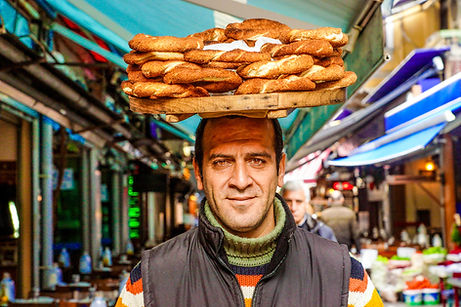
Recipe Hunting adventures in
Lebanon
We travel Lebanon visiting the homes of women who are a part of the Souk el Tayeb organization which brings the diverse people of Lebanon together though food. Watch the films below or scroll down to read more about the organization.

souk el tayeb
In 2004, Kamal Mouzawak began Souk el Tayeb Market in downtown Beirut to bridge the gap between small scale farmers and consumers. Over time, the market became a community where the diverse people of Lebanon unified over their shared value of traditional food culture.
Since then, the concept and community of Souk el Tayeb has spread like wildfire throughout the mountains and valleys of Lebanon, evolving into markets, festivals, restaurants, and guest homes. Each establishment prides itself on its regionally grown food and the local women who cook it.
Today, Souk el Tayeb is internationally renowned for its national success in revitalizing sustainable farming methods and traditional food making, decentralizing opportunity into rural areas and impoverished communities, empowering women, and ultimately unifying a nation.
All of this is done through food.
Join us in celebrating the goodness they bring to the world. Yalla!
souk el tayeb
“Souk el Tayeb is a dream. A dream of bringing people together, a dream of celebrating what is positive and constructive in Lebanon, a dream of perpetuating what is good about its land, its agriculture, its cuisine and its people.” - Kamal Mouzawak, founder of Souk el Tayeb, Beirut's 1st Farmers' Market
We have always held the belief that a home-cooked meal can bring together a family and a tradition can strengthen its ties. We walk away from our experiences in Lebanon in a state of awe, realizing that not only a family, but an entire nation can be united and fortified through the celebration of food, tradition, and home-cooked meals.
A multitude of ethnicities and religions are inextricably woven into the social fabric of the vibrant country of Lebanon, making it the most diverse country in the Middle East. Combining human diversity with the country’s agricultural bio-variance and fertility make for a magnificent, colorful food scene. This culinary splendor can be experienced every Wednesday and Saturday morning in the heart of downtown Beirut where farmers, artisan food makers, and home-cooks gather from every nook and cranny of Lebanon to share their regional produce, home cooked meals, and desserts at Souk el Tayeb ("tayeb" means tasty, delicious, or good, while souk means “market”). More than a farmers’ market, Souk el Tayeb is a place where the diverse people of Lebanon commune over their shared love of food, tradition, and family. But most importantly, Souk el Tayeb is a place where the women in Lebanon take the lead.






 |  |  |
|---|---|---|
 |  |  |
 |  |  |
Souk El Tayeb was founded in 2004 as a producers-only farmers’ market, a platform where farmers could come from rural areas to urban areas to sell their produce and goods. After the success of the original Beirut Market, in 2007, the organization began regional food festivals celebrating the typical cuisines and culinary treasures of the region, such as the cherries of Hammana, the kibbeh (crispy, bulgur croquettes stuffed with minced meat, onions, spices, and sauteed pine nuts) of Zgharta, and the traditional kaak bi halib (soft milk cookies) from Marjeyoun. During the festivities, the locals nominated and invited the best home-cooks to prepare lunch comprised of typical dishes from their regions. The home-cooked lunches were a huge hit and the concept eventually evolved into the restaurant, Tawlet (meaning table). Tawlet is a farmers’ kitchen in downtown Beirut where mothers and grandmothers are hand-selected from around Lebanon to cook their local, traditional, homemade food, one day a month from fresh ingredients provided by local farmers. These home-cooks pour their heart, souls, and energy into the quality of their recipes with a yearning for all customers to feel as if they are eating as a family in their home. A restaurant where complimenting the chef will result in hugs, kisses, pinched cheeks, and a pocket full of maamoul cookies for the road.




Not only has Souk El Tayeb and Tawlet succeeded in celebrating and promoting the positive aspects of multiculturalism in Lebanon, but it has provided countless women with the most precious gift to be had, purpose. We spent over two weeks with the Souk “family,” as the women invited us into their homes, teaching us their traditional recipes and recounting to us their inspirational stories: from the Syrian refugee who has been given a sense of belonging, to the mother who is now able to provide her children with college educations, and to the grandmother who just bought herself her very own car. With tears in their eyes, these women professed their gratitude for the Souk. And with every woman involved comes a family, a friend, a neighbor who in turn becomes part of this ever-expanding, organic community. Because of the Souk El Tayeb, a sense of unity has spread throughout the country, bringing its people together through the power and kinship of women. We are so grateful to have been invited into their family to learn their traditional recipes and moving stories.














